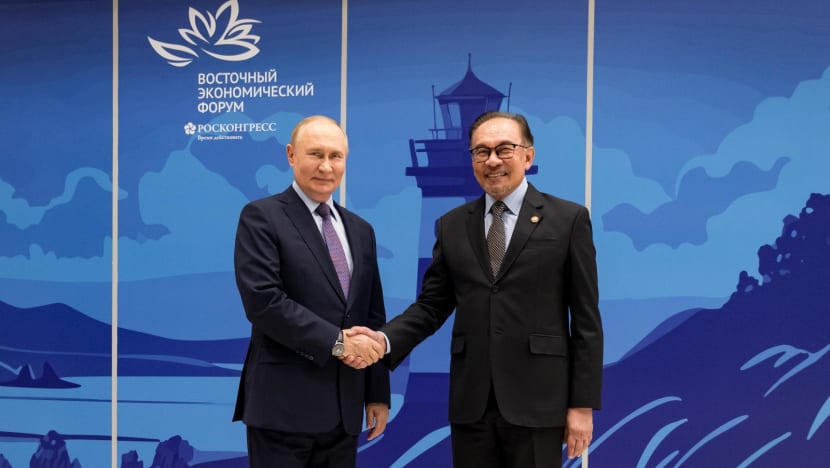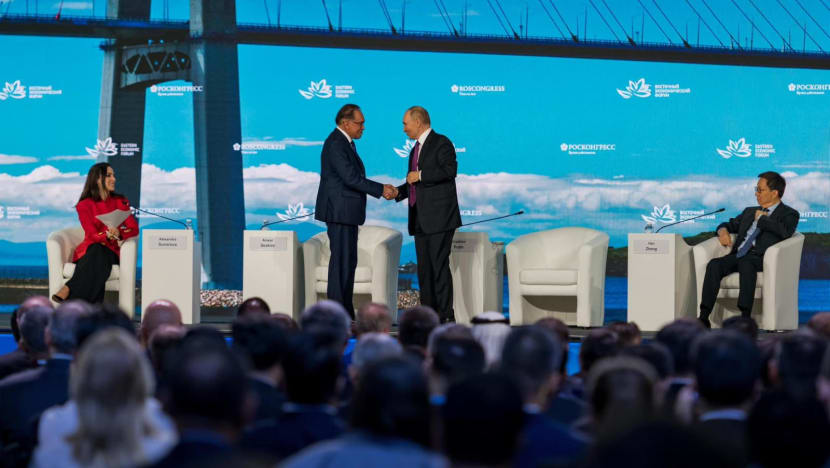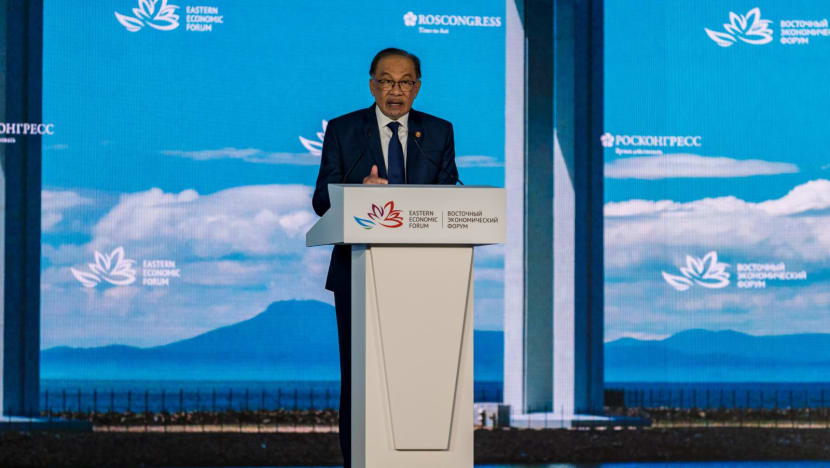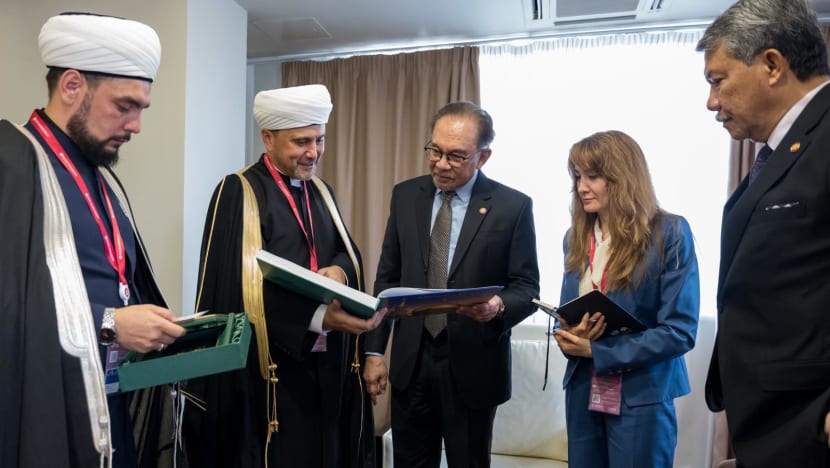Analysis: Malaysia cosies up to Russia and invites Putin to ASEAN summit, but ‘bold’ move could ruffle feathers
While some experts say Malaysia’s growing proximity with Russia could raise eyebrows, others believe this underlines Malaysia’s “non-aligned foreign policy” and its wish to join the BRICS group of emerging economies.

Malaysia Prime Minister Anwar Ibrahim meets Russian president Vladimir Putin on the sidelines of the 9th Eastern Economic Forum (EEF) in Vladivostok. (Photo: Fath Rizal/Prime Minister's Office of Malaysia)

This audio is generated by an AI tool.
JOHOR BAHRU: In his speech at the 9th Eastern Economic Forum (EEF) in Vladivostok on Thursday (Sep 5), Malaysian Prime Minister Anwar Ibrahim stressed that as upcoming chair of the Association of Southeast Asian Nations’ (ASEAN), Putrajaya was keen on finding “synergies with other regions and key dialogue partners”.
“In this context, the ASEAN-Russia partnership is crucial in fostering economic growth, security cooperation, and cultural exchange across the region,” said Mr Anwar, who shook hands warmly with Russian president Vladimir Putin after his speech.
Mr Anwar was on a working visit to attend the forum in the southeastern Russian city which borders China and North Korea.
He and Mr Putin also met on Wednesday for a bilateral meeting during which the Russian president noted that Malaysia plays a prominent role in ASEAN and will be assuming chairmanship in 2025.
“As you know, Russia pays considerable attention to developing its relations with Southeast Asia and ASEAN,” Mr Putin told Anwar, according to transcripts released by the Kremlin.
“We sincerely hope that during your chairmanship, we will be able to explore new opportunities for cooperation with this rapidly growing and promising region,” he added.
On Wednesday, during his working visit, PM Anwar also invited Mr Putin to attend next year’s ASEAN Summit, which will be chaired by Malaysia.
Mr Anwar also accepted an invitation from Mr Putin for Malaysia to participate in the upcoming BRICS summit in Kazan, Russia in October.
He said in a Facebook post that the invite was a “clear testament” to the importance Russia places on Malaysia and marks “a significant step” towards Malaysia’s goal of joining the organisation.
Attendance at the meeting of major emerging economies would mark the second meeting between Mr Anwar and Mr Putin in two months.
Experts told CNA that developments this week signalled growing proximity between Russia and Malaysia.
They added that Prime Minister Anwar’s decision to forge ties between ASEAN and Moscow could stir uneasiness among some members of the regional bloc and its dialogue partners, including the United States as well as other western countries.
Mr Anwar follows in the footsteps of India’s prime minister Narendra Modi, Chinese president Xi Jinping, North Korea’s supreme leader Kim Jong-un, Indonesian president Joko Widodo and Myanmar junta chief Senior General Min Aung Hlaing in meeting with Mr Putin since the start of Russia’s invasion of Ukraine more than two years ago.
During his meeting with Mr Putin, Mr Anwar also praised the Russian president for steering his country’s development, adding that his decision to visit Russia was “not an easy one” but he believed it was “the right decision”.
Geopolitical expert Tunku Mohar Mokhtar from Kuala Lumpur’s International Islamic University told CNA that Russia’s foreign policy is advocating greater involvement away from the West, and moving towards greater cooperation with the Global South - encompassing some countries in Asia, Latin America and Africa.
“Russia still considers itself a great power. By endearing itself to the developing countries, Russia could position itself as their leader. Growing disappointments with the West would entice countries like Malaysia and Indonesia to forge closer relations with Russia,” said Mr Tunku Mohar.
He noted that from Russia’s perspective, stronger relations with Southeast Asian countries could balance the US’ and the West’s influence in the region.
However, he also noted that some ASEAN countries such as Singapore and the Philippines may be uneasy with Russia’s greater efforts to engage Southeast Asia.
The latter has been traditionally close to the US while Singapore has openly criticised Russia for the Ukraine War, and also imposed sanctions on Moscow.
The measures include imposing export controls on items that can be used directly as weapons in Ukraine, and blocking certain Russian banks and financial transactions connected to Russia.
Dr Ian Storey, a senior fellow at the ISEAS-Yusof Ishak Institute, told CNA that Russia is keen to raise its game in Southeast Asia because it wants to demonstrate to the West that its efforts to isolate Russia following its invasion of Ukraine have failed, especially in the Global South.
He added that Russia wants to circumvent Western sanctions by increasing sales of oil and natural gas to regional states.
However, he stressed that there will be a mixed reception for Russia’s involvement in the region.
“The Kremlin has some old friends in Southeast Asia, including Vietnam, Laos, Indonesia, Malaysia and Thailand. It has also moved closer to Myanmar since the military seized power in February 2021. But Singapore and the Philippines remain opposed to Russian aggression against Ukraine,” said Dr Storey.
The US has also been critical of some countries that have hosted Mr Putin since Russia’s invasion of Ukraine.
For instance, in response to Mr Putin’s visit to Mongolia this week, Washington said that no country should give him “a platform to promote his war of aggression against Ukraine”, a similar line it took against Vietnam earlier in 2024 for hosting the Russian leader.
Observers added that Mr Anwar inviting Mr Putin to next year's ASEAN Summit was a notable development.
The ASEAN Summit typically also encompasses other summits such as the ASEAN-China Summit, the ASEAN-US Summit and the East Asia Summit.
Russia, US and China are members of the East Asia Summit.
"It's a bold move by Anwar to invite Putin to the East Asia Summit, as some of ASEAN's Dialogue Partners may threaten to boycott the meeting if the Russian leader attends,” said Dr Storey.
However, he noted that Mr Putin had attended the East Asia Summit only once in person - during the 2018 event held in Singapore, and that Russia is likely to send Foreign Minister Sergey Lavrov instead for next year’s Summit.
Dr Azmi Hassan, a senior fellow at the Nusantara Academy for Strategic Research, told CNA that many countries in ASEAN have strong trade ties with the US and given how Russia and the US are locked in two opposing camps, Mr Anwar’s invitation to Mr Putin could raise eyebrows among some regional countries.
“Malaysia will be ASEAN Chair next year and this will make things complicated for the US especially because Malaysia has no problem working alongside the likes of Putin, Xi, even though Anwar has stressed that he wants to display neutrality,” said the political analyst.

ANWAR’S BRICS AMBITIONS STAYING CONSISTENT TO NEUTRALITY?
Analysts told CNA that Mr Anwar’s visit to Russia is partly to underline Malaysia’s foreign policy which embraces the principle of “neutrality” and being “everybody’s friend”. At the same time, they added that the prime minister was keen to reiterate Malaysia’s wish to join the BRICS group of emerging economies.
BRICS, established in 2009, initially included Brazil, Russia, India, and China, while South Africa joined a year later. It has since expanded to include Egypt, Ethiopia, Iran and the United Arab Emirates.
The international organisation now contributes to a quarter of the global economy, accounts for one-fifth of global trade and represents about 40 per cent of the world’s population.
Mr Tunku Mohar told CNA that Malaysia’s neutral stance entails keeping equidistance among major powers and befriending these powers in the process.
“It has economic cooperation, trade relations and strategic partnerships with most of these powers. PM Anwar stresses pragmatism in Malaysia's foreign policy, based on its national interests. Meeting Putin, in this sense, is a continuation of Malaysia's foreign policy,” said Mr Tunku Mohar.
Dr Storey echoed similar sentiments, stressing that Malaysia continues to pursue a “non-aligned foreign policy” to keep its relations with the major powers in equilibrium.

During a dialogue session at the EEF on Thursday, Mr Anwar stressed that Malaysia was keen to continue trade cooperation with all sides - including the US, Europe, China and Russia.
“Russia has been traditionally a good country that we work well (with) diplomatically … there are vast opportunities, we have seen its resilience and its capacity to expand in all sectors,” he added.
Mr Anwar also reiterated how Malaysia could add value if it is allowed membership to BRICS.
He said: “Being in BRICS would allow us to benefit and share. Malaysia is now a hub for semiconductors in the region … I think the Global South network of BRICS will give us an opportunity to leverage to ensure that there are fair trade practices, that the international financial infrastructure is not monopolised by one country or one region.”
“And then, essentially, it will be beneficial, not only to Malaysia, when I think about the Global South and naturally to the whole world,” he added.
Dr Storey outlined that pushing for Malaysia’s BRICS application was top of Mr Anwar’s agenda during the visit.
He stressed that even though Russia would like to see an enlarged BRICS to counter the G7, it is unclear whether Malaysia will be granted full membership at the upcoming BRICS Summit or be designated as a BRICS Partner.
Dr Storey said: “However, because Malaysia is chair of ASEAN in 2025, its full membership application might be endorsed … BRICS leaders have spoken of the need for a closer relationship with ASEAN so Malaysia stands a good chance.”
The G7 is an informal group of advanced democracies which comprises the United States, Germany, Britain, France, Italy, Canada and Japan.
GAZA CONFLICT A FACTOR FOR MALAYSIA, INDONESIA
Experts added that the Muslim-majority countries such as Malaysia and Indonesia have been demonstrably vocal about their discontent over the US and the West’s positions on the Gaza conflict.
They added that by meeting and forging ties with the likes of Russia and China, the likes of Malaysia and Indonesia are signalling discontent over US continued support for Israel in the Gaza conflict.
Besides Mr Anwar, Indonesian president-elect Prabowo Subianto visited Russia in July and signalled that after he takes office in October his administration will pursue closer ties with Russia, said Dr Storey.
He outlined that Malaysia and Indonesia tend to view Russia as “Islamic-friendly” due to Moscow’s long-standing support for Palestinian statehood.
“As with many Malaysians, Anwar has been horrified at the death and destruction in Gaza and has criticised the West, especially the US, for providing arms to Israel. As a result, public perceptions of the US in Malaysia have declined while Russia's has gone up,” he added.

Dr Azmi noted that Indonesia would have remembered how during the 2023 ASEAN Summit chaired by Jakarta from 5 Sep to 7 Sep, US president Joe Biden did not attend despite receiving an invite.
He attended the Group of 20 (G20) Leaders’ Summit in India from 9 Sep to 10 Sep that year instead.
At the time, experts said his no-show called into question Washington’s commitment to the bloc, which could in turn lead to ASEAN states leaning closer to the likes of Beijing and Moscow.
Dr Azmi added that a year on, this notion seems to be playing out.
“When Jakarta was ASEAN chairman in 2023, Jokowi also maintained close ties with (Russia’s) Putin and (China’s) Xi and this led to some Western states being uneasy. Malaysia could also face the same problem next year but in reality, it is staying true to its neutral, non-aligned strategy,” said Dr Azmi.
Mr Tunku Mohar added that for countries like Malaysia and Indonesia, hedging their foreign policy with the likes of Russia and China could be worth the risk, provided the losses from lesser cooperation with the West can be compensated with the gains.
“Obviously, Muslim-majority countries like Malaysia and Indonesia would prefer to work with countries that have shown sympathy with the Palestinian cause. Russia's stance on the Gaza conflict has endeared her to many Muslim-majority countries,” he said.
However, the geopolitical expert stressed that for Mr Anwar, this hedging policy could give him and Malaysia a more vocal platform to speak out on the Gaza conflict.
“PM Anwar still prefers to keep close relations with the West, and he would highlight the plight of the Palestinians, especially those in Gaza, when opportunities come, such as in bilateral or multilateral meetings with Western leaders,” added Mr Tunku Mohar.
















